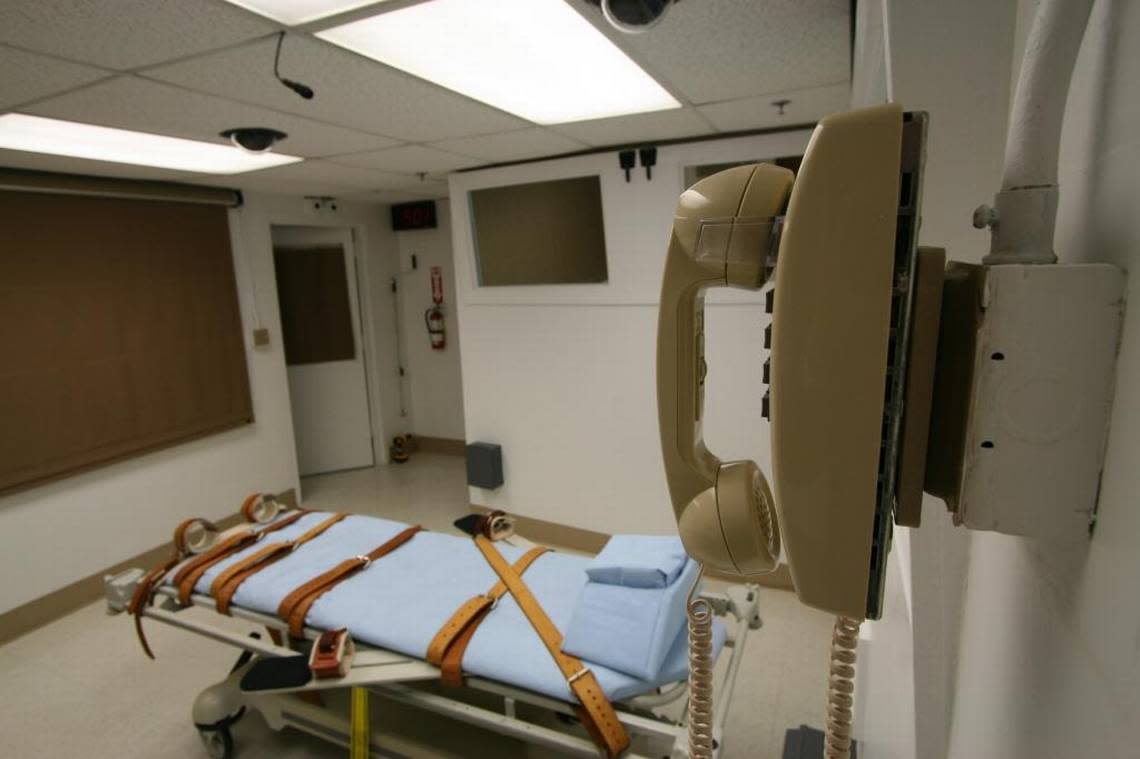Florida wants child rapists sentenced to die. U.S. Supreme Court has ruled otherwise

- Oops!Something went wrong.Please try again later.
Acting on a proposal from Gov. Ron DeSantis, Florida lawmakers filed legislation Wednesday to allow the death penalty for adults who sexually abuse children younger than 12.
The bills would put Florida at odds with U.S. Supreme Court precedent saying that capital punishment can only be applied in the case of murder. But the bill sponsors — Sen. Jonathan Martin, R-Fort Myers, and Rep. Jessica Baker, R-Jacksonville — are seeking a challenge of prior rulings.
A 2008 Supreme Court case, Kennedy v. Louisiana, and a 1981 Florida Supreme Court case were “wrongly decided and an egregious infringement of the states’ power to punish the most heinous of crimes,” the bills’ text reads.
DeSantis, when announcing his proposal in January, made similar comments.
“We do not believe the Supreme Court, in its current iteration, would uphold it, and so we are going to be exploring ways to facilitate some capital trials if you have the worst of the worst,” he said.
Florida statutes already say sexual battery of a child under 12 is a capital felony, but it has been effectively moot because of Supreme Court rulings barring the death penalty in such cases. The bills filed Wednesday say it’s the Legislature’s intent that the procedure in the statute, allowing for capital punishment, be followed.
Martin said it was time for the Supreme Court to consider “the safety and the well-being of our little kids.” Martin said he thinks sexual battery of a child is worse than murder, and as a father of three children, he would rather be killed than have someone touch his children.
“The goal of this bill is to discourage anybody who might ever contemplate something this horrific and steer them in another direction,” Martin said.
Stephen Harper, the founder of Florida International University’s Florida Center for Capital Representation, said using the death penalty for cases other than murder has been effectively prohibited since a 1977 Supreme Court case, which was reinforced in 2008.
“It is unconstitutional to kill anybody for any crime other than first-degree murder, period,” Harper said. “There’s no reason for the Supreme Court of the United States, as conservative as it is, to change the law with respect to expanding those that are eligible for the death penalty.”
Another death-penalty proposal
The proposed legislation also matches another bill that proposes lowering the threshold for the death penalty from a unanimous jury recommendation to an 8-4 vote. Sen. Blaise Ingoglia, R-Spring Hill, and Rep. Berny Jacques, R-Seminole, filed legislation to change the jury requirement.
Lowering the jury threshold is another move backed by DeSantis, who has expressed outrage about a jury’s vote in favor of a life sentence instead of a death sentence for the Parkland school shooter. Three of 12 jurors voted for a life sentence instead of death.
Going to an 8-4 threshold would give Florida the lowest death penalty threshold in the nation. Only Alabama currently has a non-unanimous jury requirement, requiring at least a 10-2 vote for the death penalty.
The legislation from Ingoglia and Jacques would also bring back the ability for a judge to override a jury’s recommendation for a life sentence and to give the death penalty instead.
It would make Florida the only state in the nation to allow for judicial override, which Florida allowed until the Legislature reworked the laws in 2016. In current statute, Florida judges can still override a jury’s recommendation for the death penalty and give a life sentence instead.
But in the bill filed by Martin and Baker, judicial override — in either the direction of death or life — is prohibited.
The bills filed Wednesday say that if a death sentence for sexual battery is reviewed and found unconstitutional by the Florida Supreme Court or the U.S. Supreme Court, the defendant should be resentenced to life in prison.
Last week, Florida executed the first inmate in three years. Donald Dillbeck, who was convicted in 1991 and sentenced to death on an 8-4 jury vote, died by lethal injection on Feb. 23.
